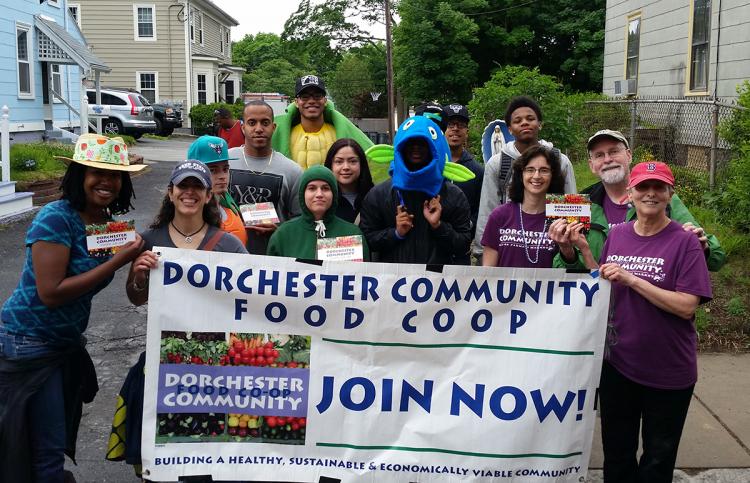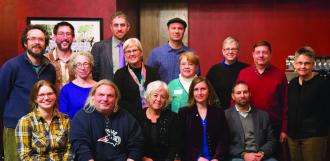Cooperative Fund of New England:


Participants
Duke Bouchard • Chief financial officer of River Valley Food Co-op in Northampton, Massachusetts
Rebecca Dunn • Executive director (retiring in February 2019 after 30 years) of Co-op Fund of New England
Susy Ellis • Chief executive officer of Coastal Documentation in Spruce Head, Maine
Bonnie Hudspeth • Member programs manager of Neighboring Food Co-op Association
Marilyn Scholl • former manager of CDS Consulting Co-op
Maggie Cohn • Southeast New England loan and outreach officer of Cooperative Fund of New England
A conversation moderated by Maggie Cohn
Rebecca Dunn: Cooperative Fund of New England—CFNE—was started in 1975 with money from the Haymarket People’s Fund and money George Pillsbury gathered from friends and family, about $25,000. Those funds seeded CFNE, and the first borrower was Buffalo Mountain Food Co-op in Vermont.
Susy Ellis: Most New England states had co-op warehouses; each sent two representatives. I started working with CFNE in 1980, representing Maine. We met three times a year, overnight at the home of executive director Laddie Lushin, and made all decisions at those meetings.
Marilyn Scholl: Did you bring sleeping bags?
Susy Ellis: Of course! It was a big sleepover, really fun. One man knitted; he could finish a pair of mittens during one meeting. Then we had a visioning meeting in Rangeley, Maine. CFNE had grown to $250,000, and we were figuring out how to double that; it seemed like a herculean task.
Marilyn Scholl: When did it shift from being only food co-ops to broadening out?
Rebecca Dunn: In 1982 we started lending to worker co-ops, and to housing co-ops in 1984. We expanded to meet a need.
Susy Ellis: I left in 1996, and by then we were lending to all kinds of cooperatives and a couple of nonprofits. People heard about us.
Marilyn Scholl: And we had money to lend.
Susy Ellis: We were still lenders of last resort. There weren’t good co-op laws in every state; no bankers understood how co-ops worked, they couldn’t figure out how they’d get money back from all those people.
Maggie Cohn: What was the growth curve?
Susy Ellis: When we hired Rebecca in 1986, she was the sole staff person.
Rebecca Dunn: Loan and outreach officers were added in 1994 when I moved to Wilmington, North Carolina. When I was hired in 1986, we had $162,000 in total assets. By 2010, our 35th year, we had over $7,000,000 in investments, and now we’re up to around $30,000,000.
Maggie Cohn: Who are those investors?
Rebecca Dunn: The majority are individuals, faith-based groups, co-ops, and some foundations. Occasionally, we get some money from the CDFI (Community Development Financial Institutions) Fund of the US Treasury.
Marilyn Scholl: When did food co-ops start investing, and why?
Susy Ellis: CFNE is an excellent place to park money. We’ve never lost a dollar, we put it to use with values that co-ops care about, and we can pay a percent or two, which is more than you’ll get on most savings accounts.
Rebecca Dunn: The first co-op to invest may have been Onion River. Middlebury invested early in the loan fund, as did Putney.
Susy Ellis: I think co-ops that invested early had people on our board, who knew us and could assure their members they wouldn’t lose money. Those co-ops that are so beautiful and successful today invested early on.
Marilyn Scholl: Are they still invested today?
Rebecca Dunn: Yes. Food co-ops have always supported various innovative products that we developed to expand the sorts of funds we can provide—the Co-op Capital Fund, the collateral pool, business support fund, and now a new pre-development product. Food co-ops have been willing to put their money at risk because we’re responsive to needs of co-ops; since we’re good at lending and monitoring the fund, their risk is pretty minimal.
Maggie Cohn: What changes have you seen in food co-ops over the years?
Marilyn Scholl: Food co-ops seeing themselves as businesses. When I started, we didn’t act as if profits, management, or governance mattered, or broadly serving our members. Co-ops weren’t very clean; customer service was rare. It was all very small scale. Everyone pitched in and it was a lot of fun, but they were more like clubs than businesses. By taking ourselves seriously, we’re able to make a much bigger impact, whether it’s healthy food access, support for local farmers and local agriculture, reinvesting in community, or paying fair and better wages.
Bonnie Hudspeth: Another thing is that the conversation around food security and economic inclusion has changed. When CFNE and Neighboring Food Co-op Association (NFCA) first approached funders for support on this issue, we encountered resistance based on perceptions that food co-ops were irrelevant to issues of healthy food access. However, food co-ops have always been focused on food security, whether during the Industrial Revolution, the Great Depression, or in the 1970s when many of our current food co-ops got their start.
Marilyn Scholl: And we should mention the change from each co-op being isolated and independent to being more connected, whether that’s through National Co+op Grocers or capital funds like CFNE or peer networks like NFCA. It’s very difficult to operate on a completely isolated basis; co-ops that are successful have gotten out of isolation and into cooperation.
Bonnie Hudspeth: With the Healthy Food Access Project, we used partnerships with community organizations, peer networking, and resource development to help food co-ops develop or improve programs in response to the needs of their communities—particularly in addressing diversity and inclusion. During its first five years, this collaboration helped food co-ops across New England increase their collective impact and helped over 1,000 low-income households to access healthy food. And this project has expanded into a broader effort to help co-ops be more welcoming, inclusive, and relevant.
Susy Ellis: I mentioned the co-op warehouses of the 1980s—co-ops connected there. When the warehouses closed, many co-ops were isolated.
Maggie Cohn: Why did the warehouses close?
Marilyn Scholl: There was not enough capital and not enough volume. There were too many of them, each needed a building, and a truck…
Susy Ellis: One thing that strikes me is that my co-op, Good Tern in Rockland, Maine, borrowed $5,000 in 1980 to get started. We had members and needed just $5,000 to get going. No-one comes in now asking for $5,000—it’s never less than $50,000, often $1.5 million.
Marilyn Scholl: That’s the change in the industry. When we started, no one was selling what we were selling; now everyone sells what we sell, even convenience stores. In the ‘70s people had no choice if they wanted natural, organic, local food. As the food trends changed, other people wanted what we had.
Duke Bouchard: Maybe the competition is good—it’s made us focus on better management, being better operators and being a stronger business, even though the competition itself is really hard and brutal. It’s forced us to get together.
Maggie Cohn: Are co-ops still relevant?
Marilyn Scholl: Co-ops are absolutely relevant. If not, there wouldn’t be so many start-ups, so many communities that want a food co-op. It takes an incredible amount of time, money, and risk to start a co-op, and yet they’re starting all over the country. What’s relevant may have changed since Susy’s co-op started, but it’s still about meeting members’ needs and doing that—
Susy Ellis: —in a democratic way, where everyone has a say.
Marilyn Scholl: Yes, based on values.
Susy Ellis: Exactly.
Marilyn Scholl: Fairness, justice, treating everyone along the supply chain as fairly as possible—and those are hard, hard things to do. But our economy needs us more than ever as an example and a reality of a business model based on equity and fairness rather than on extraction and exploitation.
Duke Bouchard: That’s great, Marilyn. I’m sitting here at work getting goosebumps of inspiration.
Bonnie Hudspeth: Co-ops will stay relevant by being leaders in building a more inclusive economy that provides opportunity to more people. We need the democratic and values-driven structure of cooperative businesses to address the financial, environmental and power imbalances we’re experiencing nationally and globally.
Maggie Cohn: Do you see our organization as a loan fund changing?
Duke Bouchard: CFNE will need flexibility. We’re not going to see the levels of profitability in most co-ops that we used to see. Higher wages will lead to higher personnel expenses and lower margins. We’ll need to focus on management and governance and how well co- ops are structured from a monitoring standpoint as much if not more than financial performance. Obviously, the latter is important, but the numbers we’re used to seeing are not going to be there.
Susy Ellis: It will be important to bring in technical assistance as soon as we see the first hint of trouble.: And to continue responding to the changing needs of our stakeholders. We’re seeing an increase in cooperative development in communities of color, where New England’s co-op movement overall has had limited impact. Efforts in the CDFI industry and co-op movements are focusing on racial equity. At CFNE, we’re examining how we function, identifying policies, procedures, and practices that can change to advance racial equity and support cooperative growth, while staying within our core programming of providing financing and technical support.
Marilyn Scholl: We may return to the point where banks won’t fund co-ops. Based on Duke’s points, balance sheets will be thinner. Co-ops won’t be able to save cash from operations. The ones that can now walk into a bank can get a loan will need us again, and we’ll be here.
Rebecca Dunn: There have been times when co-ops have been “in” and banks would fund them, and other times when banks walk away.
Marilyn Scholl: But we’re going to be here for the long haul. •
PHOTOS courtesy of Cooperative Fund of New England
Dorchester Community Food Co-op, The Dorchester Food Coop is a grassroots initiative to build a community and worker-owned grocery store that makes healthy food accessible and advances economic opportunity through neighborhood engagement. The Dorchester Food Coop envisions a diverse community with opportunities for employment, ownership, and access to healthy food. As a food coop, we will serve and reflect the wide variety of ethnic, racial, and socio-economic groups that make up the neighborhoods of Boston.
CFNE board and staff members at Rebecca Dunn's 2018 retirement party, December 7, 2018 at Democracy Brewing in Boston. Bottom row, left to right: Lane Fury (staff), Board member Andy Danforth, Rebecca Dunn, board members Bonnie Hudspeth and Daniel Ross. Standing, left to right: board members Jonah Fertig and Duke Bouchard, Maggie Cohn and Micha Josephy (staff), board members Marilyn Scholl (board chair), Matt Feinstein and Susy Ellis, Deborah Hawkins (staff), board member Jon Reske, and Dorian Gregory (staff). PHOTO: CFNE.







